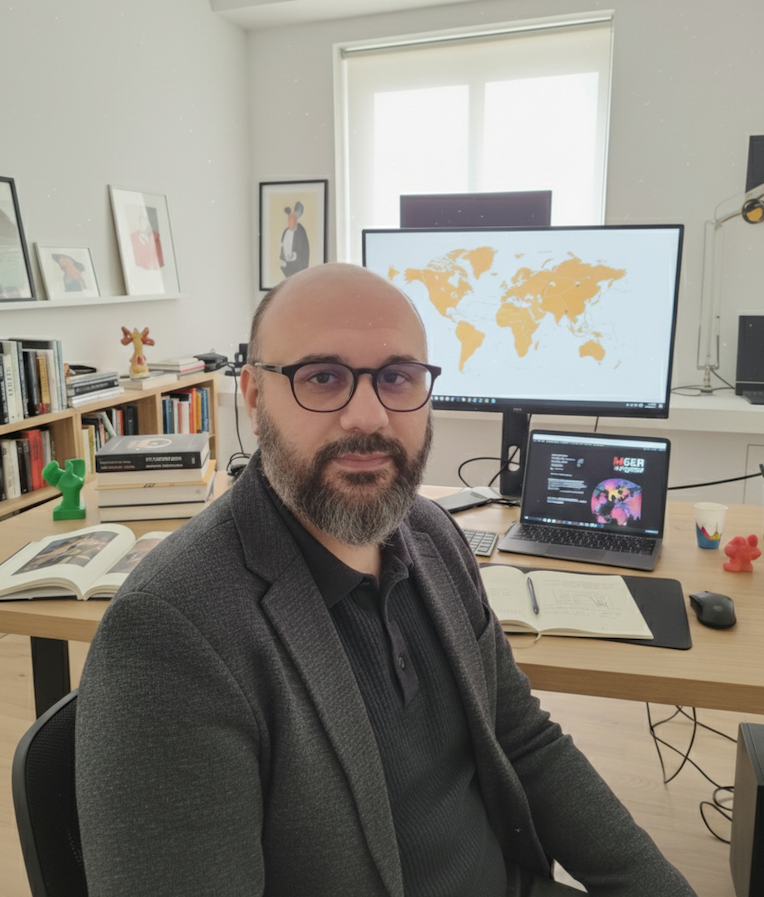
Professional Background
Art Historian, Researcher, and Curator
Victor T. Murari holds a PhD in Aesthetics and Art History from the Postgraduate Program in Aesthetics and Art History (PGEHA) at the University of São Paulo (USP) and the Museum of Contemporary Art (MAC USP). An independent researcher and curator, he is currently developing the Decolonial Atlas project, which investigates the intersections between contemporary art, digital art, digital colonialism, artistic resistance, and subaltern poetics. His work critically examines the impacts of artificial intelligence and neoliberal dynamics on the preservation, curation, and access to digital art.
With an interdisciplinary background, Murari collaborates with researchers, artists, and cultural institutions on projects that challenge hegemonic paradigms and promote decolonial approaches in art. His work encompasses theoretical research, experimental curation, and the production of critical knowledge, contributing to the debate on technology and coloniality in contemporary art.
Before starting his independent career, Murari worked at prominent institutions such as the Pinacoteca do Estado de São Paulo, the São Paulo Museum of Art (MASP), and MAC USP. In these roles, he developed expertise in research, curation, teaching, and education. He participated in curatorial and pedagogical projects aimed at critically revising museum narratives, and fostering dialogue between art, technology, and decolonial thought.
Murari’s professional trajectory reflects a commitment to expanding the boundaries of art history and curation, emphasizing the importance of inclusive and critical practices that address the complexities of contemporary digital culture and its global implications.
Areas of Expertise
Victor T. Murari holds a PhD in Aesthetics and Art History from the Postgraduate Program in Aesthetics and Art History (PGEHA) at the University of São Paulo (USP) and the Museum of Contemporary Art (MAC USP). An independent researcher and curator, he is currently developing the Decolonial Atlas project, which investigates the intersections between contemporary art, digital art, digital colonialism, artistic resistance, and subaltern poetics. His work critically examines the impacts of artificial intelligence and neoliberal dynamics on the preservation, curation, and access to digital art.
With an interdisciplinary background, Murari collaborates with researchers, artists, and cultural institutions on projects that challenge hegemonic paradigms and promote decolonial approaches in art. His work encompasses theoretical research, experimental curation, and the production of critical knowledge, contributing to the debate on technology and coloniality in contemporary art.
Before starting his independent career, Murari worked at prominent institutions such as the Pinacoteca do Estado de São Paulo, the São Paulo Museum of Art (MASP), and MAC USP. In these roles, he developed expertise in research, curation, teaching, and education. He participated in curatorial and pedagogical projects aimed at critically revising museum narratives, and fostering dialogue between art, technology, and decolonial thought.
Murari’s professional trajectory reflects a commitment to expanding the boundaries of art history and curation, emphasizing the importance of inclusive and critical practices that address the complexities of contemporary digital culture and its global implications.
Research Interests
Victor T. Murari conducts interdisciplinary research exploring the intersections between contemporary art, digital art, and digital colonialism, with a focus on power dynamics and resistance in museological contexts. His work investigates how artificial intelligence and digital technologies impact the preservation, curation, and access to art.
His research critically examines the relationship between artificial intelligence, digital colonialism, and neoliberalism, analyzing how algorithms and technological infrastructures perpetuate or challenge hegemonic structures in the art world. His approach combines critical theory, decolonial studies, and case study analyses, contributing to the construction of new epistemologies and curatorial practices.
Current projects include:
Decolonial Atlas – A research and curatorial project mapping artistic and curatorial practices of resistance to digital colonialism, analyzing how artists and institutions confront the impositions of algorithmic technologies.
AI and Museum Decolonization – A study on the use of artificial intelligence in museums, assessing its influence on curation, accessibility, and the preservation of digital art.
Digital Archives and Subaltern Poetics – Research on the construction of digital archives as a form of resistance and visibility for subaltern narratives in contemporary art.
Decolonial Aesthetics in the Digital Age – Theoretical investigation into decolonial aesthetics in times of hyperconnectivity and automation, exploring how artists and curators problematize the relationships between technology, identity, and memory.
His work aims to contribute to critical debates on the materiality of the digital, the agency of algorithms, and the reconfiguration of artistic systems amid contemporary technological and political transformations.
